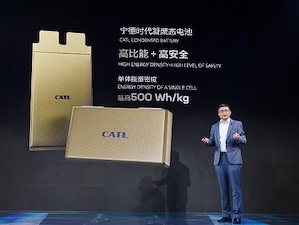“The launch of condensed batteries will usher in an era of universal electrification of sea, land and air transportation, open up more possibilities of the development of the industry, and promote the achieving of the global carbon neutrality goals at an earlier date,” the company said in a presentation at Auto Shanghai.
CATL’s new condensed battery will have almost double the energy intensity of Tesla’s 4680 cells, whose rating of 272-296 Wh/kg are considered very high by current standards.
CATL chief scientist Wu Kai says the condensed battery integrates a range of innovative technologies, including the ultra-high energy density cathode materials, innovative anode materials, separators, and manufacturing processes, offering excellent charge and discharge performance as well as good safety performance.
He says the new technology breaks the limits that have long restricted the development of the battery sector and will open up a new era of electrification centred on high safety and light weight.
During the presentation, CATL said its working with partners on the development of electric passenger aircraft practicing aviation-level standards and testing in accordance with aviation-grade safety and quality requirements.
In addition to aircraft, CATL says it will soon launch the automotive-grade version of condensed batteries which it says will also go into mass production within this year.
Batteries with 500 Wh/kg will enable electrification of passenger aircraft
In 2020 Elon Musk said “electric flight starts to get interesting once you hit 400wh/kg”. At the time he predicted that this would become possible by 2023.
The announcement this week confirms and even exceeds Musk’s prediction that this level of energy density would be commercially possibly by now.
Earlier this month Argonne announced a new battery technology with an energy density of 1200 Wh/kg although that technology is not yet ready for bas production.
“With further development, we expect our new design for the lithium-air battery to also reach a record energy density of 1200 watt-hours per kilogram,” said Argonne scientist Larry Curtiss. “That is nearly four times better than lithium-ion batteries.”
While there have been many high-density battery breakthroughs in recent months, many of these technologies are only in their infancy and will take many years to reach mass production (if they ever achieve it at all).
What makes CATL’s announcement this week truly groundbreaking is that the condensed battery will go into mass production this year.


